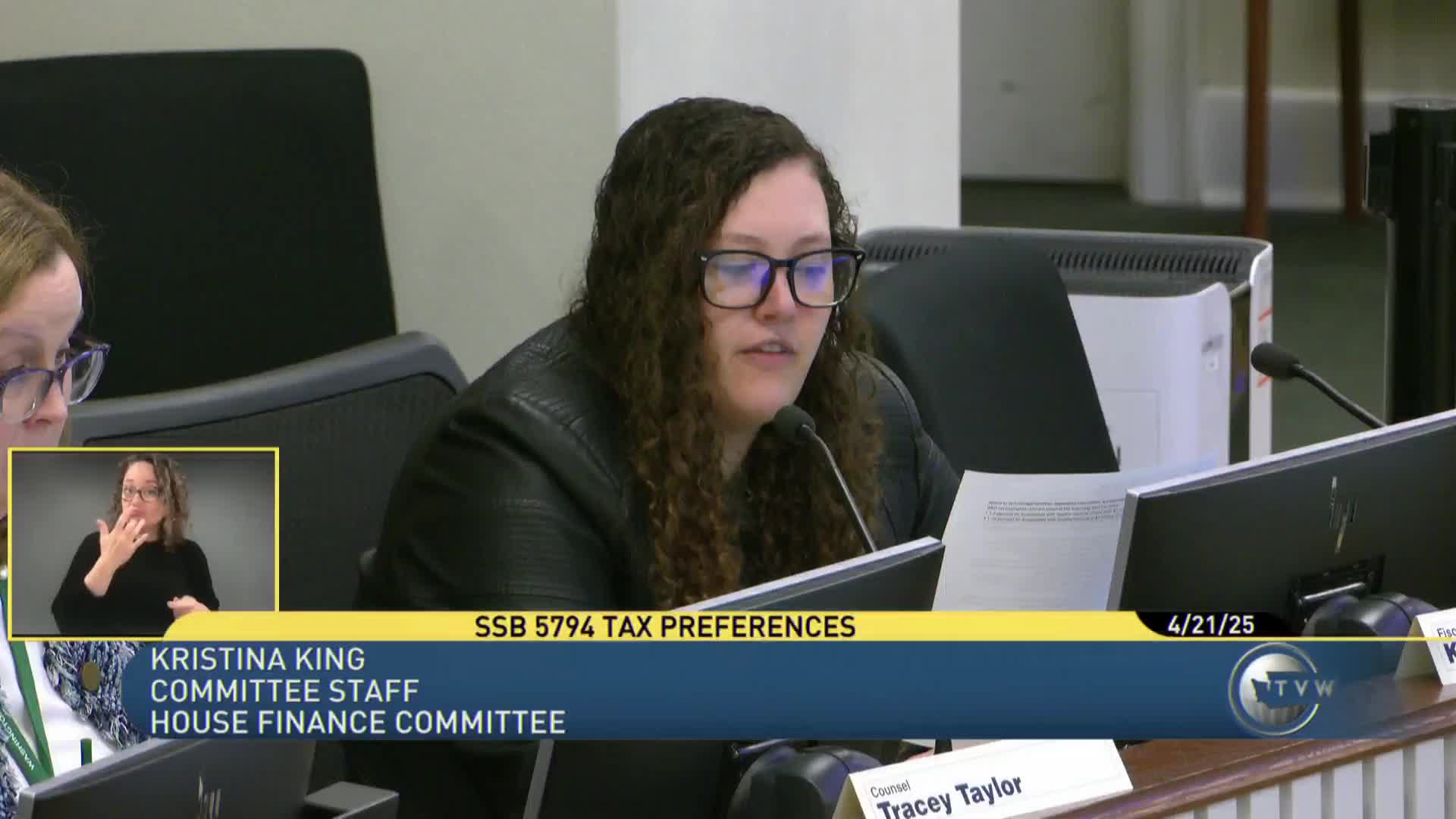Committee hears hours of testimony on proposed expansion of sales tax to services, digital advertising and additional cigarette tax
Get AI-powered insights, summaries, and transcripts
Subscribe
Summary
A legislative committee held a public hearing April 21 on Senate Bill 58 14, which would expand sales taxes to multiple services and digital products, increase per‑cigarette taxes and require a one‑time prepayment of state sales tax by very large retailers.
A legislative committee held a public hearing April 21 on Senate Bill 58 58 14, a broad tax package that would classify additional services and certain digital products as taxable retail sales, expand the definition of tobacco products to include nicotine whether derived from tobacco or synthetic sources, raise per‑cigarette taxes and require a one‑time prepayment of state sales tax by very large monthly filers.
Christina King, staff to the committee, summarized the bill’s contents, saying customers “do not pay retail sales and use tax on most services” but that the bill would add categories including information technology consulting and training, custom website and software work, security monitoring and armored‑car services, temporary staffing, and certain advertising services. King also described an added excise on cigarettes and reiterated that the Department of Revenue may provide altered filing frequencies for small taxpayers.
The bill would also treat “digital products” and some digital automated services (DaaS) as subject to sales and the retailing business & occupation tax unless specifically excluded. King said some exclusions remain—for example, services that “primarily involve the seller’s application of human effort,” live presentations, advertising services in limited cases, and data processing services.
Why it matters: supporters say the measure modernizes an older tax code and raises revenue to avoid deep program cuts; opponents contend it will raise costs for small businesses, non‑profits and local events and risk pyramiding of taxes.
Supporters included local government and labor representatives who said expanded revenue is necessary to preserve services. Lindsay Sherman Warren, a Port Angeles city council member testifying for her city, said reform “makes sense” to maintain critical local services such as hospitals and childcare. Labor and public‑service groups — including the Washington Public Employees Association and the Washington Federation of State Employees — urged passage to prevent cuts to inspections, college access and frontline public services.
Opposition centered on specific industries that said the measure would hit revenue sources essential to narrow‑margin operations. Lisa Brummell, co‑owner of the Seattle Storm, testified the teams rely on sponsorship and signage revenue that makes up a large share of income and asked that arena signage be excluded. Anne Shively, vice president and general manager of the Tri‑City Dust Devils, told lawmakers the bill would “increase our tax rate on sign revenue by over 600%” and would be “devastating” to minor‑league sports teams that rely on local sign advertising. Chris Massey, representing Seattle Rain FC and Seattle Sounders FC, asked for a carve‑out for physical signage because the bill exempts traditional TV and radio advertising.
Trade groups and business tax experts urged rejection of portions of the expansion. Patrick Reynolds of the Council on State Taxation said many of the proposed business‑to‑business service taxes “cause pyramiding, which results in a lack of transparency.” Deb Peters, representing Americans for Digital Opportunity, said the digital advertising component raises potential legal risks, including possible conflict with the federal Internet Tax Freedom Act and Commerce Clause concerns.
On tobacco, advocates including Annie Tagan of Tobacco Free Kids and Ben Buckholtz of the Vapor Technology Association supported the higher cigarette tax and expanded coverage of nicotine products as a public‑health measure. Tagan said the tax is “incredibly effective as a deterrent for youth smokers” and would support prevention and cessation programs.
The bill also includes an administrative provision King described as a one‑time sales‑tax prepayment: taxpayers who file monthly combined excise returns and who had $3,000,000 or more in taxable retail sales during calendar 2026 must make a one‑time prepayment due June 25, 2027 equal to 80% of the state sales tax collected and remitted for the June 2026 reporting period; the remaining liability would be reconciled on the regularly filed return due July 26, 2027. King said penalties would apply for underpayment but that the Department of Revenue may waive penalties if a taxpayer demonstrates June 2027 retail sales were less than the June 2026 amount.
No votes were taken. The committee concluded the public hearing after hearing multiple panels of in‑person and remote witnesses and instructed that written testimony be submitted within 24 hours for anyone who did not testify in person.
Ending: The committee did not act on the measure at the hearing; hearings for the same bill and related tax proposals are expected to continue as legislators weigh revenue options for the budget cycle.
